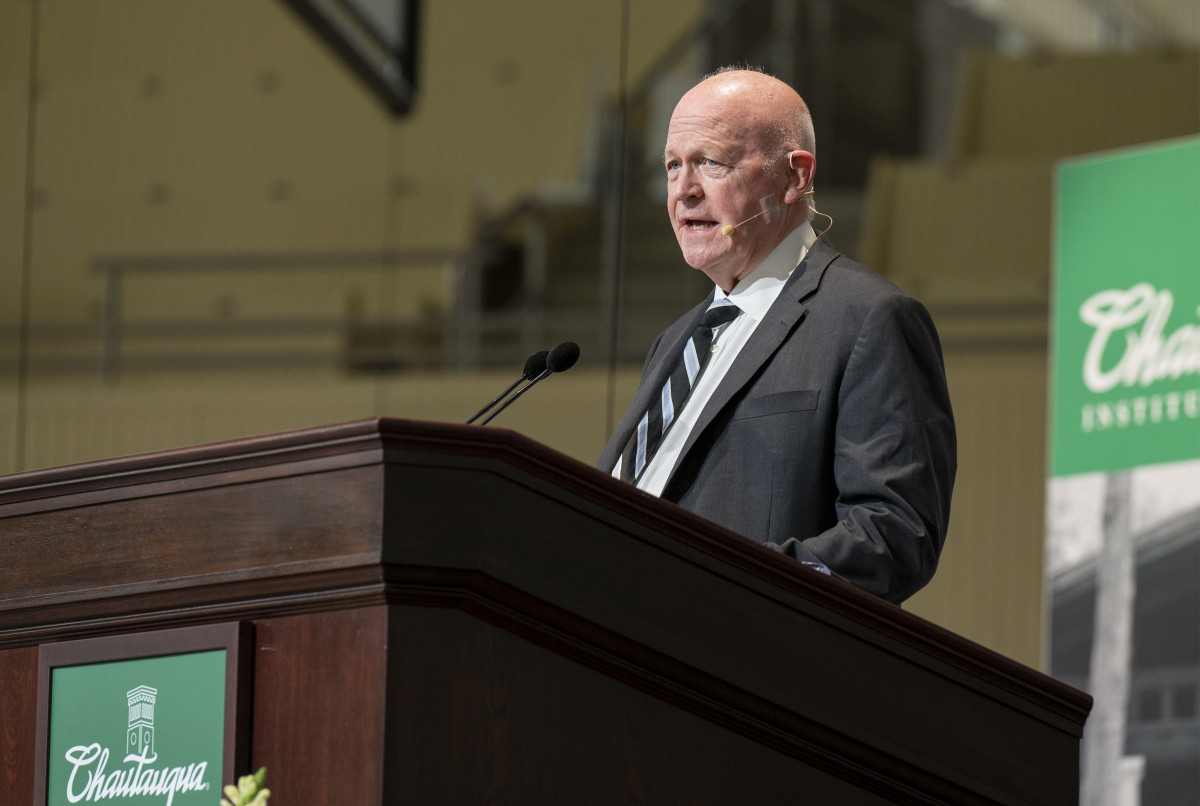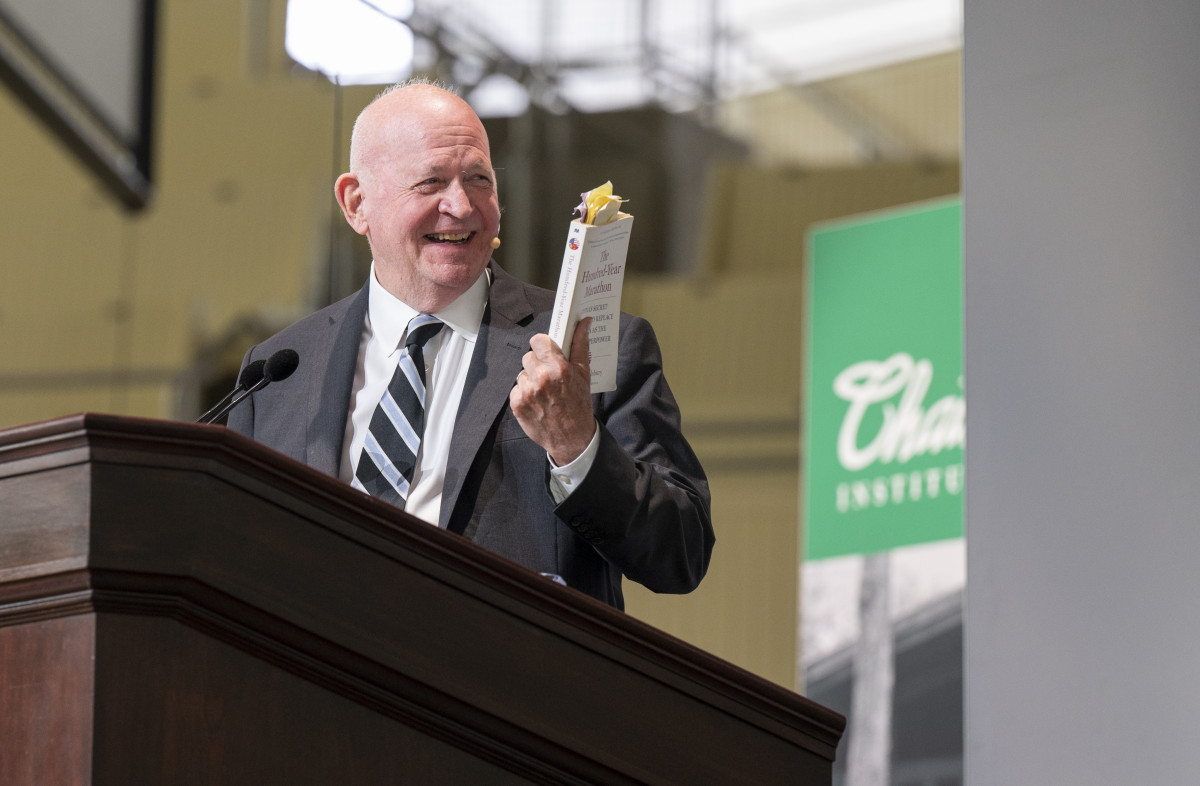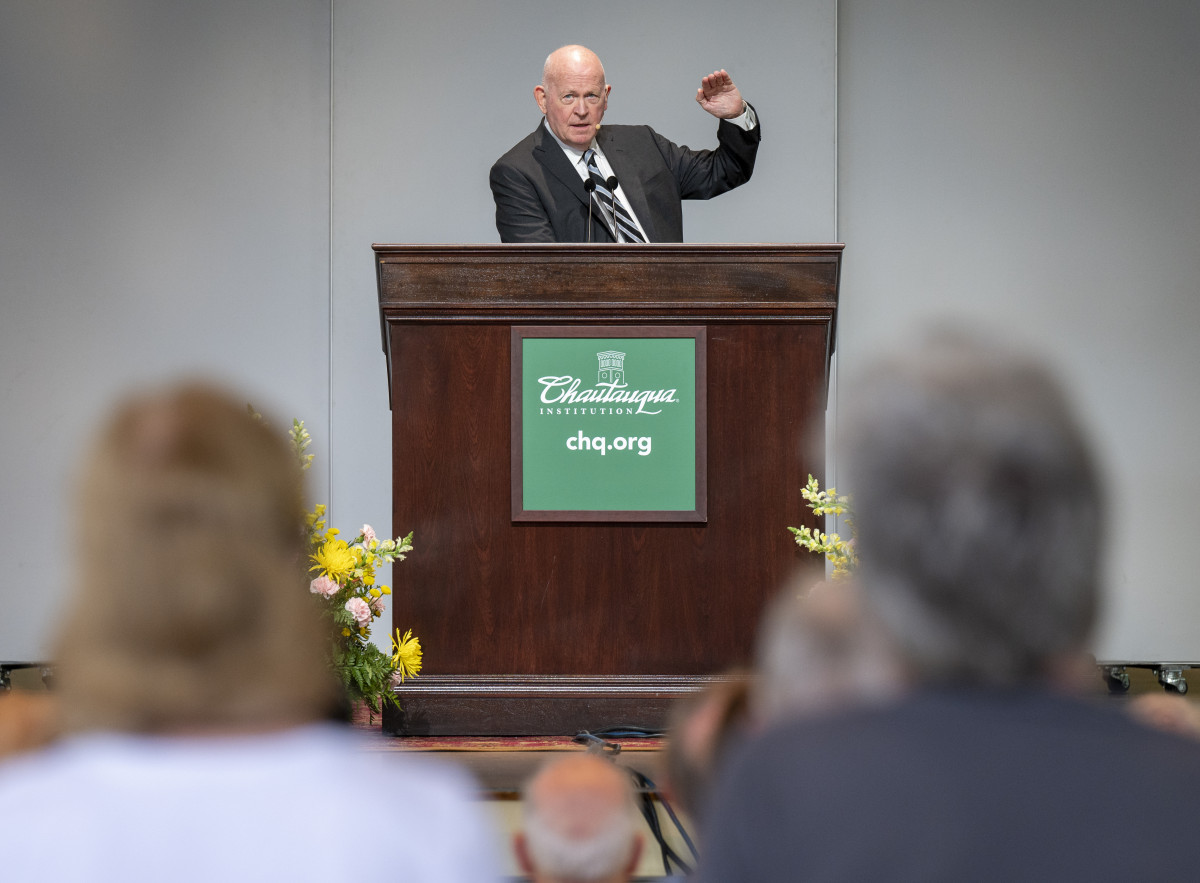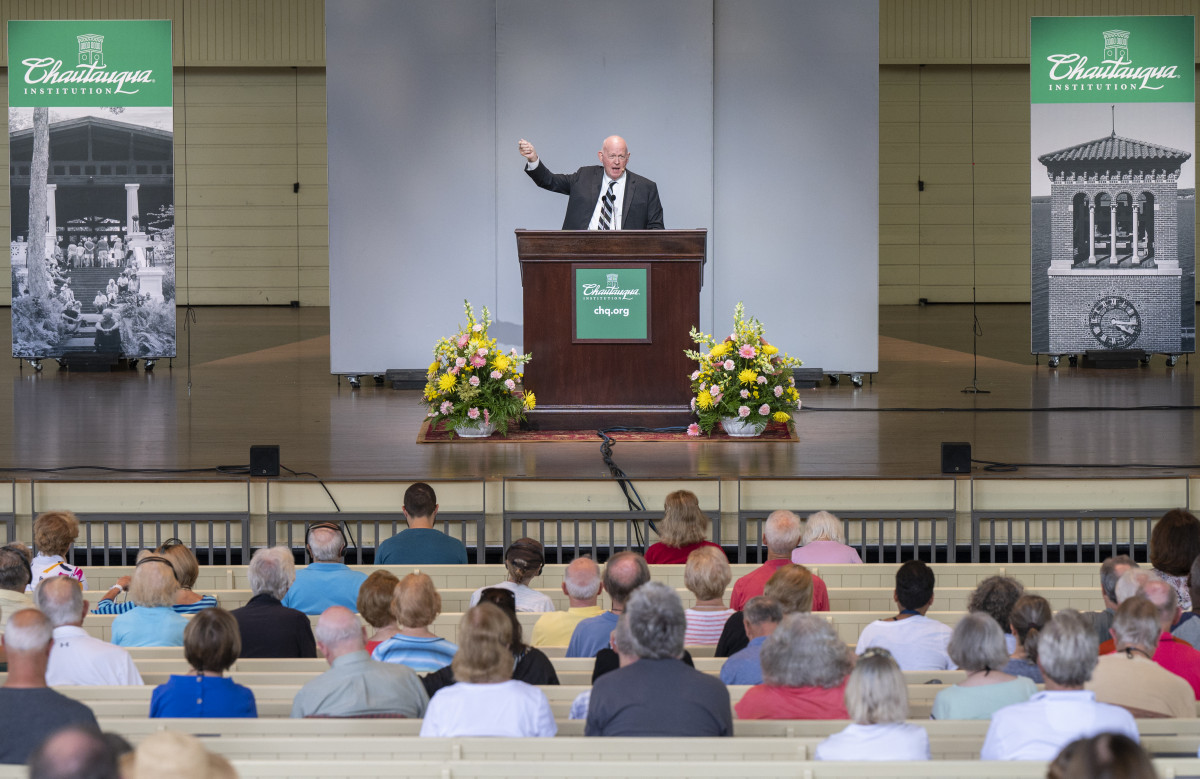NICK DANLAG – STAFF WRITER
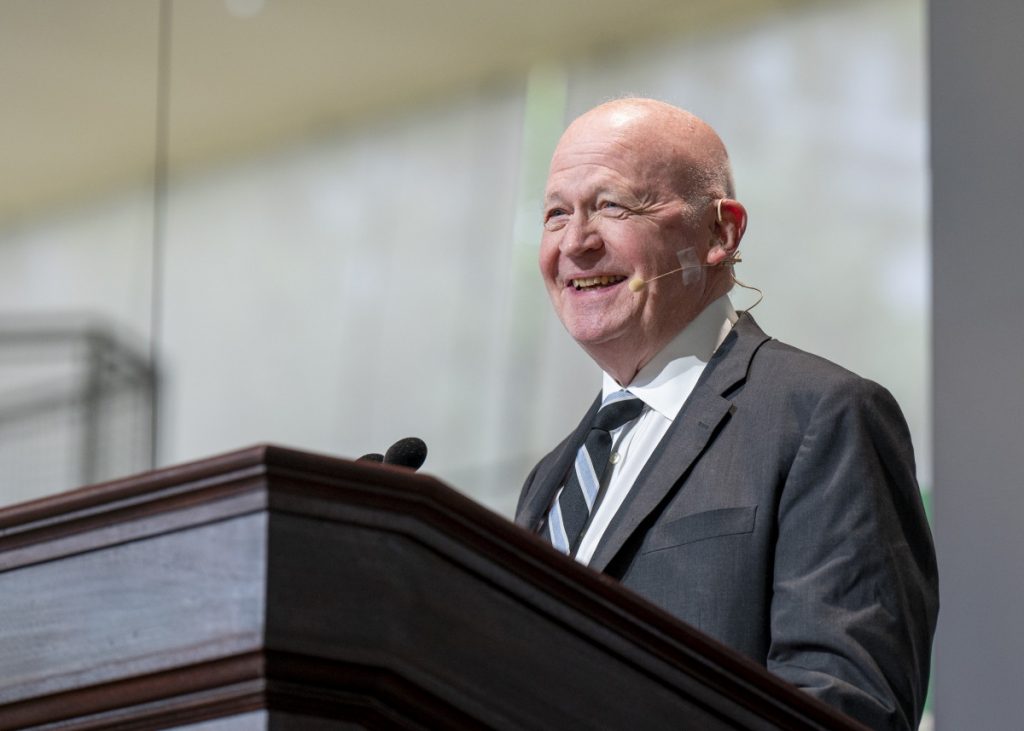
The first thing, Michael Pillsbury said, that President Joe Biden needs to understand when approaching diplomacy with China is the balance of power. During his campaign, Pillsbury said, Biden did not seem that concerned with China.
But Pillsbury is impressed that the president’s sentiment has changed. Biden is now saying that the United States is in major competition with China and has brought up the country multiple times during the recent G-7 conference, for example.
Currently a senior fellow and director for Chinese strategy at the Hudson Institute, Pillsbury has served in the U.S. government for more than 40 years, working with presidents including Jimmy Carter, both Bushes and, most recently, Donald Trump.
At 10:30 a.m. Wednesday, June 30 in the Amphitheater, Pillsbury discussed multiple questions he believes the Biden administration needs to consider as they tackle large issues regarding China. His lecture was the fourth installment of the Chautauqua Lecture Series of Week One, “China and the World: Collaboration, Competition, Confrontation?”
Biden’s advisers, Pillsbury said, have grouped issues with China into three categories: adversarial, which includes the U.S.’s condemnation of what it considers the genocide of the Uyghur people; competition, which includes Chinese corporations selling technology that rivals the U.S.; and cooperation, which includes both countries working together on climate change initiatives.
Pillsbury said there is rare bipartisanship in Congress when it comes to diplomacy with China. Most senators, for example, voted for a bill that requires a Congressional review when China buys any small, tech-focused American startups.
The next aspect that Biden needs to consider is how tough to be on China, including in trade, technology and economic investments. Pillsbury said there is a lot of debate around this topic. President Barack Obama and his administration, around seven years ago, called for the arrest of five Chinese hackers, some of whom focused on getting nuclear reactor information from a company in Pittsburgh in order to advance Chinese technology.
Biden needs to consider the great risk involved with letting China steal military technology, Pillsbury said, while also not stoking the flames too much and risking another Cold War.
And what would a cold war with China look like? That was the next question Pillsbury brought up, one which he called “devilishly difficult.”
Despite their history as allies in World War II, within a few years, the Soviet Union and the United States were engaged in the Cold War. During this time, Pillsbury said the U.S. government established the Central Intelligence Agency, the Department of Defense (which unified the branches of the military), the Air Force (which used to be a part of the Army), and the National Security Council.
Pillsbury said that in comparison, the U.S. has not done much to prepare for a cold war with China.
Pillsbury told a story about dedicated, China-focused offices in each department of the U.S. government. When members of the Chinese military were visiting Washington, Pillsbury was involved in a tour of those offices. At that time, only four people dedicated to China issues worked in the Pentagon.
“The Chinese general says, ‘No this isn’t the real one.’ They were talking amongst themselves: ‘The Americans are deceiving us, they are making us think that they don’t take China seriously,’ ” Pillsbury said. “So we never again did that.”
Pillsbury then transitioned into the next issue Biden must understand: unity within China. To truly understand this issue, Pillsbury said one must know about the four T’s.
The first is Taiwan. Different presidents have taken different positions on Taiwan. President Richard Nixon’s policy was that Taiwan was a part of China, while other presidents, like Bill Clinton, said that it wasn’t, but also that it wasn’t an independent country. Aligning with China would open more doors for cooperation, but not all presidents have taken that tack.
The second and third T’s were Tibet, where the Dalai Lama is in an exile government that has power over the area but is not recognized by China; and Turkestan, the homeland of the Uyghur people, a mainly Muslim, Turkic ethnic group who live in China’s North-Western Xinjiang Province.
When President George W. Bush was compiling a list of terrorist organizations in the world in the early 2000s, China said that if the East Turkestan Independence Movement was not added to the list, the country would likely not help in the war on terror.
“So everyone rushes to the files. People at the CIA and other places (say), ‘What the hell is the ETIM? There’s nothing on it,’ ” Pillsbury said. “So ordinarily you would have said, ‘No, sorry, we can’t confirm there’s any such thing.’ But some people, and there was really harsh discussion, … some people said, ‘The Chinese say it is a terrorist organization, it goes on the list.’ ”
Pillsbury said that 20 years later, the world learned that Uyghurs were in “re-education” camps. One Chinese diplomat claimed that all the doors in the camp were open, and they were free to leave whenever. The New York Times asked to visit the camps to verify this claim, but China declined.
“The truth is, my fear is we know way too little about China, especially in the important areas. So more work with China, and more work to understand Chinese strategy, is very important.”
-Michael Pillsbury, Director for Chinese Strategy, Hudson Institute
The last T is Hong Kong — though Pillsbury admitted that there is no T in Hong Kong.
Pillsbury said a question among media coverage is if China’s treatment of Hong Kong has broken the 1984 declaration between Hong Kong and the United Kingdom — an agreement that gave Hong Kong all the rights of autonomy.
“The first year of the Trump administration, the Chinese announced this declaration is null and void,” Pillsbury said. “President Trump did not object at that time. President Biden faces this issue now.”
As he wrapped up his lecture, Pillsbury made one final point: the need for those in the West to better understand China.
“The truth is, my fear is we know way too little about China, especially in the important areas,” Pillsbury said. “So more work with China, and more work to understand Chinese strategy, is very important.”
Chautauqua Institution President Michael E. Hill asked Pillsbury how he thought China would celebrate its 200th anniversary of the Communist Party in the country. Its 100th anniversary was on the same day of Pillsbury’s lecture.
Pillsbury said many think that China will collapse eventually, either because the Communist Party will break up or because its economy will slow down.
“In a 100 years, you’re looking at the balance of power clearly going towards China,” Pillsbury said. “The China experts who say China is going to collapse, the Communist Party is going to collapse, hopefully they’re right. But I don’t think so.”


